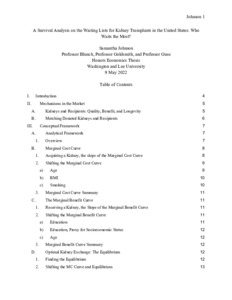| dc.rights.license | In Copyright | en_US |
| dc.creator | Johnson, Samantha | |
| dc.date.accessioned | 2022-05-13T15:07:32Z | |
| dc.date.available | 2022-05-13T15:07:32Z | |
| dc.date.created | 2022 | |
| dc.identifier | WLURG38_Johnson_ECON_2022 | |
| dc.identifier.uri | http://hdl.handle.net/11021/35855 | |
| dc.description | Thesis; [FULL-TEXT FREELY AVAILABLE ONLINE] | en_US |
| dc.description | Samantha Johnson is a member of the Class of 2022 of Washington and Lee University. | en_US |
| dc.description.abstract | The National Organ Transplantation Act, passed in 1984, continues to be utilized in an effort to address the disparity between the quantity supplied and demanded of kidneys. The
National Organ Transplantation Act declared organs to be a "scarce public resource," and that such a resource should be distributed "by criteria based on need, effectiveness, and fairness that are publicly stated and publicly defended" (Gupta 2008). However, who dictates and enforces such criteria is not well defined nor regulated. Subsequently, as the average length of time one must wait to receive an organ increases, many wonder what characteristics, if any, makes an individual more inclined to be moved off the waitlist and to receive a kidney donation. Although the United States' altruistic-driven kidney market is hypothetically structured in such a way that organs are "distributed fairly using a transparent system," certain biases may persist as they would in any other setting (National Kidney Foundation 2021). The following theoretical analysis will examine why certain characteristics are expected
to influence the aforementioned 'transparent' matching process such that the system disproportionately benefits certain demographics. The theoretical analysis will be twofold. The
first segment of the analysis will observe an individuals' likelihood of being placed on the transplant list. The second will then consider an individual's likelihood of receiving a transplant
conditional they are on the waiting list. [From Introduction] | en_US |
| dc.format.extent | 51 pages | en_US |
| dc.language.iso | en_US | en_US |
| dc.rights | This material is made available for use in research, teaching, and private study, pursuant to U.S. Copyright law. The user assumes full responsibility for any use of the materials, including but not limited to, infringement of copyright and publication rights of reproduced materials. Any materials used should be fully credited with the source. | en_US |
| dc.rights.uri | http://rightsstatements.org/vocab/InC/1.0/ | en_US |
| dc.subject.other | Washington and Lee University -- Honors in Economics | en_US |
| dc.title | A Survival Analysis on the Waiting Lists for Kidney Transplants in the United States: Who Waits the Most? (thesis) | en_US |
| dc.type | Text | en_US |
| dcterms.isPartOf | RG38 - Student Papers | |
| dc.rights.holder | Johnson, Samantha | |
| dc.subject.fast | Kidneys -- Transplantation -- Economic aspects | en_US |
| dc.subject.fast | Transplantation of organs, tissues, etc. -- Law and legislation | en_US |
| dc.subject.fast | UNOS (Organization) | en_US |
| local.department | Economics | en_US |
| local.scholarshiptype | Honors Thesis | en_US |
